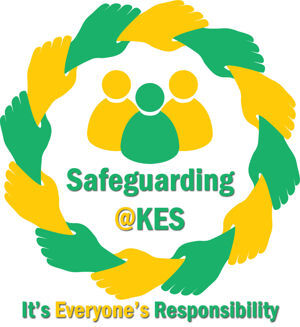- Home
- Student Welfare
- Safeguarding
Safeguarding

KES has a comprehensive designated Safeguarding Team that consists of the Headteacher, Ms Ingate, a Safeguarding Lead and SEMH Lead (Social, Emotional Mental Health), Mr Feeley (Senior Deputy Head), and Safeguarding Deputies, Mr Read (KS3 Pastoral Lead), Mrs Evison (KS4 Pastoral Lead) and Mrs Appleyard (Safeguarding Manager).
They have very clear parameters within which they are allowed to operate and must take any concern seriously – whether it has been raised by the child in person, a member of staff or from an external source.
When a concern is raised about the safety of a child, the school is legally required to follow the concern through; this may well mean reporting the concern to the Initial Response Team at Essex Child Protection. This can be very distressing for both parent and child, but it will be done with the view to supporting them through any issues and looking for positive outcomes for all parties. The school takes its safeguarding role very seriously and will not hold back in its legal responsibility to safeguard all the children in its care.
For any safeguarding enquiries, please email:
The school has a number of policies in place to safeguard students, these can be found in the policies section of our website which can be accessed by clicking here.
We have a whole section dedicated to E-Safety on our website, this can be viewed by clicking this link.
If you have a safeguarding concern and you are unable to contact any members of the school Designated Safeguarding Team as noted above, and you feel that a student is at immediate risk of harm, please contact the following services.
If the student is an Essex resident, please call the ESSEX CHILDREN & FAMILY HUB on 03456037627 or EMERGENCY DUTY SERVICE (Immediate out of hour’s response) on 03456061212.
If the student is a Southend resident, please call SOUTHEND CHILDREN’S SOCIAL CARE & EDUCATION SERVICE on (01702) 215007.
If the situation is an emergency, please call ESSEX POLICE 999/112, for either Essex or Southend students.
The King Edmund School adopts a zero tolerance policy towards all forms of child-on-child abuse, and ensures that no form of any such abuse (no matter how ‘low level’ it may appear) is ever dismissed as a joke or banter. We identify and handle cases sensitively, appropriately, and promptly. We ensure that there are effective policies in place, procedures and practices to prevent, identify, and appropriately respond to cases of child-on-child abuse.
If a student feels that they are a victim of any form of child-on-child abuse, whether it is verbal or physical, they should report it immediately to their form tutor or other member of staff so that it can be followed up through our safeguarding/child-on-child abuse policy.
Children are vulnerable to extremist ideology and radicalisation. Similar to protecting children from other forms of harms and abuse, protecting children from this risk is part of the schools' safeguarding approach.
Extremism is the vocal or active opposition to our fundamental values, including democracy, the rule of law, individual liberty and the mutual respect and tolerance of different faiths and beliefs. Radicalisation refers to the process by which a person comes to support terrorism and extremist ideologies associated with terrorist groups.
County Lines is the police term used for the criminal exploitation of children and young people.
It is where urban gangs use children and young people to move drugs and money across the country using dedicated mobile phone ‘deal lines’. It comes with the associated harms to the young person such as sexual exploitation, violence and human trafficking. Part of the school's safeguarding role is to help identify vulnerable children that may be at risk of being exploited.
The school has a robust internet filtering system and all parents and students are required to sign the school internet agreement. Student use of the internet is closely monitored.
Students are also taught about the safe and effective use of the internet, through lesson content as well as assemblies and special talks. This is an ever changing picture and it important that our youngsters are equipped with the skills to protect themselves online.
Where we become aware that students are using social networking sites inappropriately at home, we will contact parents and work with them to support the students in protecting themselves online in the future.
Students and parents are encouraged to report any online abuse; this can be done via the CEOPS website. The school works closely with POLIT (Police Online Investigation Team) to keep abreast of trending issues and will alert parents to problems.
If parents have any concerns whatsoever about their child’s use of the internet and or social media sites, they are encouraged to contact the school for support; it is imperative that as adults we look to protect our youngsters in an online world that changes on a daily basis.